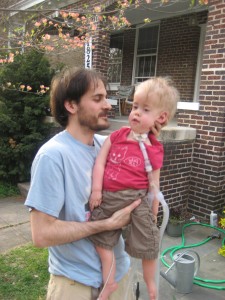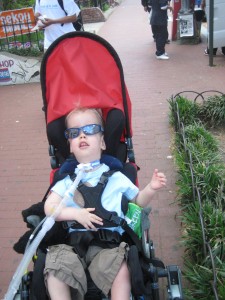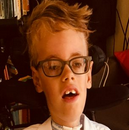Krista’s NW Visit (May 28)
Despite his questionable fashion sense (see previous post), Lucas is doing well these days. He’s added “cat” and “hug” to his vocabulary, and we’re working on “dinosaur” so he can start requesting more books by name. Unfortunately he’s still reticent to perform for the camera (besides waving his arms in the universal “gimme!” sign), but we’ll catch some more video soon.
Although I’ve been back almost a week, I thought I’d write a bit about my adventures in the northwest. (Krista writing, this time.) The trip was meant to be a combination of exploration and information seeking for our pending move, along a relaxing visit home. And somehow with what felt like a dozen meetings scheduled in two cities over the course of 5 days, I managed to make all that happen. Or, I should say, lots of people helped me make that happen.
Building on the research that Burke did a couple weeks ago, I went to check out another preschool in Seattle and met with a special ed service coordinator in Portland. Both meetings were somewhat informational, but like Burke’s visit, they were also hard. I was reminded of how complicated it is to describe Lucas. Often I found myself really emphasizing Lucas’s disabilities, stressing that he’s going to need A LOT of help. He can’t move his torso much. He can’t sit up, roll over without assistance, or lift his elbows if he’s sitting up… It feels terrible to describe Lucas in a list of negatives, but without doing this, professionals picture a more “typical” special needs child. In both meetings the professionals tried to be positive, but their “don’t worry, we’ll make it work for Lucas,” felt dismissive. That’s nice, I thought, but what about the fact that all the three year olds are in the sandbox right now throwing handfuls of sand at each other? Lucas’s chair could not get in the sandbox, and he certainly can’t have sand near his neck. I feel like we deserve more specific answers than “we’ll make it work,” but without having Lucas along side me to show off, I wasn’t sure what more to ask.
Of course I’m glad that the predominant philosophy in education now is to “mainstream” kids rather than isolate or hide away children with disabilities. But we also know that in a classroom Lucas is going to need nursing assistance, as well as creative teachers and aids who can help him and his peers into situations where he can express himself, learn, and play with other kids. Maybe it’s an unrealistic question to ask if those people will be there when we need them. But I wanted to know. Will there be an administration that really values difference, and models which embrace children of all abilities? And will there be wheel-chair accessible classrooms? And music rooms? And playgrounds?
We may be starting along this path of questioning a little bit early, but it feels like we should ask these questions before we choose the school district where we’ll live for the next decade or two. Ultimately, it seems that we’re going to have to trust that wherever we end up we’ll dig until we find the people who care about quality education for all children.
I also met with a pediatrician who we will likely choose for Lucas if we move to Seattle. She’s been in practice for a long time, and she’s worked with many medically fragile children. In contrast to the meetings with schools, she had a very clear idea of things she could help us with – home nursing, therapies, specialists, medical supply companies, etc. She even offered to help connect us with other parents of medically fragile kids, and she said she’s planning on reading My Baby Rides the Short Bus. (For our moms who are keeping the Portland vs. Seattle tally, that’s one point for Seattle. :)
One of the highlights of my trip was meeting Shannon, mom to a 9-year old with MTM. Their first years with MTM were very different than ours – their son was 2 when he was diagnosed with MTM and 3 ½ when he got his trach. But there are many things that felt very familiar and reassuring about meeting someone else who’s walked our path. Maybe most significantly, in light of some of our questions about schools, was hearing that Javad is thriving in his second grade classroom, and that his “typically developing” peers love and include him. It was also great to hear about some of the logistics of how they’ve structured their lives – the layout of their house, their nursing schedule, transportation options, power chairs and communication devises, etc.
Another major highlight of the trip was seeing some of the many people I love in the northwest. My mom and sister and I got out for a short but beautiful hike in the Columbia River Gorge. I got to see my friend Jennie who I’ve know forever, and who is now radiant and pregnant. And Alice, who somehow managed to act sane and hang out with me just days before turning in her dissertation. I was in Seattle for just 24 hours, but in that time I was lucky enough to get to visit with a few old friends as well as Ashley, Brandon, and our nieces. Madden, Ella, and Tya stayed up late to see me, and we read bedtime stories together. It was great to see them, and especially exciting to imagine cousin sleep-over’s that might one day have the girls reading Lucas his bedtime stories.
And it’s good to be back – I missed these guys! Here’s Lucas working on the sign for “go.”






